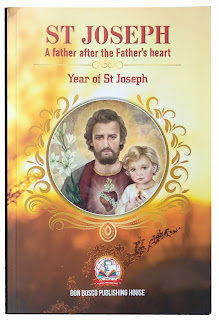The Virtues of an Authentic Life (Book Review)
Bernard Häring,
The Virtues of an Authentic Life,
Mumbai: St Pauls, 1998, ISBN 81-7109-347-7, Rs. 55, pp. 163.
The author has written over 80 books and 1000 articles. He
taught theology in Rome
for 25 years. He has also lectured at other prestigious universities. His best
known works are Priesthood Imperilled,
Evangelization Today and Free and Faithful in Christ.
The book is a collection of articles written for a magazine.
The author has given shape to his articles and has made them available through
this book. The forty four chapters of the book are divided into four parts. The
reason for doing so is not clear and neither is it mentioned. Each chapter
deals with a specific virtue and is kept to about 3-5 pages. The first part
lays the foundation for the book by clarifying the meaning and characteristics
of virtue. Virtue, the author states, is a sort of competence that adds meaning
and value to life. Living a life of virtue requires a commitment that needs to
be freely made. The virtues one chooses to live by determine one’s character.
Character formation is the greatest task in life, according to the author. He’s
making a good point here but phenomenologically, it doesn’t seem to be the
case. Perhaps the reason for this is that people have not fully realized the
value of a good character. Everybody praises a person of good character but how
many invest time and effort to build up good characters?
 The subsequent parts deal with individual virtues. The
author has done well to give a long list of virtues. These virtues are
characteristic to Christian life. The list of the author is by no means
exhaustive but it does appear so. The author attempts to explain each virtue.
His explanation includes a biblical basis of the virtue and an application to
mundane life. He offers some advice on how to cultivate and practice the virtue
but his presentation lacks charisma. I read the book without so much as a
sentence making an impression on me. My manner of reading could have been the
cause for the book having no effect on me but I don’t think that it is entirely
culpable. The author in his foreword specifically emphasizes that the book mustn’t
just be read but must be meditated on. This I didn’t do consistently but even
the chapters that I read meditatively seemed to offer me no new insight,
neither did they spur me on to acquire or enhance the particular virtue.
The subsequent parts deal with individual virtues. The
author has done well to give a long list of virtues. These virtues are
characteristic to Christian life. The list of the author is by no means
exhaustive but it does appear so. The author attempts to explain each virtue.
His explanation includes a biblical basis of the virtue and an application to
mundane life. He offers some advice on how to cultivate and practice the virtue
but his presentation lacks charisma. I read the book without so much as a
sentence making an impression on me. My manner of reading could have been the
cause for the book having no effect on me but I don’t think that it is entirely
culpable. The author in his foreword specifically emphasizes that the book mustn’t
just be read but must be meditated on. This I didn’t do consistently but even
the chapters that I read meditatively seemed to offer me no new insight,
neither did they spur me on to acquire or enhance the particular virtue.
With regard to the language of the book, I think it is
wonderful. The author has expressed his ideas beautifully and for a person like
me who delights in good prose, it was a treat. That is looking at the book from
the linguistic standpoint. From the spiritual standpoint, I felt the book
lacked punch. The title attracted me but the content failed to grab my
attention. My favourite chapter was the last chapter wherein the author
addresses ageing. This for me was the most personal and provoking chapter. The
reason being that the author shared his personal struggle. Throughout the book
it seems like he is preaching a virtue but here one can see that he is actually
living what he is writing. This for me is meaningful. The lack of personal
examples and sometimes of examples altogether left the matter in limbo. The
author has done a commendable job writing this book, considering his age which
he reveals in the last chapter. I sincerely feel that the content of this book
is best read in parts for if it is read at a stretch, its efficacy is likely to
diminish as it did with me.



Comments
Post a Comment